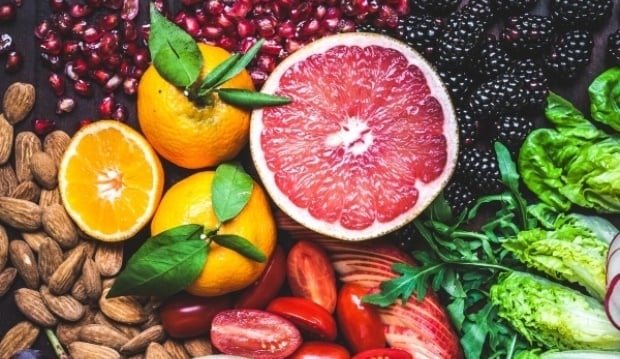
Many resolutions are about health. Perhaps you resolved to get fit, lose 10kg or overhaul your diet.
Now suddenly it all seems overwhelming and downright daunting. There’s no doubt about it – setting a goal and getting there are two different things, and it’s easy to falter along the way. But that doesn’t mean you shouldn’t have a goal.
You should still dream big. But think small – small manageable steps are more likely to get you where you want to go. Here are a few easy ways to get back on track and give your health a kick-start.
1. Get a morning nutrient boost by having a green smoothie
Invest in a blender and make a green vegetable-based smoothie every day for a week, Pretoria-based dietician Tanya Alberts suggests. Tightly pack two cups of leafy greens such as kale, spinach or Swiss chard into a measuring cup, toss into the blender, add water and blend until all the leafy chunks are gone.
Then add fruit such as mango, pineapple or banana, plain yoghurt and a little more water if you like, and blend again until smooth. You can also add a bit of fresh mint. “Using green vegetables as the main ingredients will provide your body with a lot of the nutrients it needs,” Alberts says. A green smoothie also contains lots of fibre and will dampen cravings.
2. Cut down on booze
“Cut out alcohol for a month or limit yourself to one drink on the weekend, and aim to drink at least 1,5 litres of water a day,” Joburg based dietician Jenney Meyer says. If you simply must have a glass of wine at night, increase your daily water intake by 500ml.
Meyer also suggests starting your day with a glass of warm water and lemon. “Drinking warm water first thing in the morning can help to flush the digestive system and rehydrate the body, while the added vitamin C boosts your immune system.” Cold water will also do the trick, but warm water is easier on the digestive system as its temperature isn’t a shock.
3. Go easy on the caffeine
“Limit yourself to two cups of coffee a day instead of a third, fourth or even fifth cup, and instead drink water or herbal tea. Too much caffeine can increase anxiety, raise blood pressure and negatively impact the quality of your sleep,” says dietician Kirby Hendricks of
Alex Royal Dietetics in Cape Town. “If you find it difficult to drink plain water, add cucumber, lemon slices, rosemary, mint or strawberries for flavour.”
4. Get your 40 winks. Not having enough sleep is a bad habit
“Sleep plays a huge role in your hormonal and mental health, which can affect your food choices,” Alberts says. “The hormones leptin, ghrelin and insulin affect appetite, how fat is metabolised and fat storage. A lack of sleep lowers production of these hormones, which in turn affects metabolism, blood sugar and kilojoule intake.
“Aim to get seven to nine hours of sleep a night and stick to the same sleep routine – try to go to bed and wake up at the same time, even on weekends.”
5. Go meatless once a week
Make meat-free Mondays a tradition to help reduce your risk of chronic, preventable conditions such as cancer, cardiovascular disease, diabetes and obesity, Meyer suggests.
“Swop out red meat or chicken for vegetarian alternatives such as beans, lentils or chickpeas along with plenty of fresh salads and vegetables.”
Cutting down on the amount of meat you eat has also been known to aid weight loss and improve digestion. And it can save you money!
6. Simplify things with veggie soup
For a week or two, have a homemade, nonstarchy vegetable soup for lunch or supper every day. It’s a great way to up your veggie intake and fuel a rundown body.
“You’ll be supplying your liver with the nutrients it needs to clean out toxins, soothing your gut with easily digestible fibre dense foods, and hydrating your body with fluid,” Alberts says. “The fibre also helps to regulate your blood-sugar levels.” Use veggies such as celery, onion, carrot, baby marrows, peppers, mushrooms and green beans.
7. Limit your sugar intake
“Break the habit of sweetened tea and coffee, biscuits, rusks, cakes, pastries, sweets and chocolates,” Hendricks says. “Instead, get your healthy sugars from fruit – your gut will thank you.”
8. Get in the groove to move
Vowing to exercise regularly is a common new year’s resolution for good reason – it will definitely improve your health. The trick is to keep it simple. Don’t choose a daunting activity or put yourself under pressure to do hour-long exercise sessions.
If you can fit in only mini-workouts of 15 minutes – or that’s all you have energy for – then do that, Meyer says, but do something! Go for a walk with the kids, put on music and dance, or do gentle stretches at home (there are plenty of helpful YouTube videos). Just start.
9. Quiet your mind
Meditation has been shown to reduce stress, improve concentration and focus, lower high blood pressure, boost your mood and slow down ageing. So schedule time for silence, even if it’s just five minutes in the morning or at the end of the day. Try to empty your mind and just sit and breathe.
10. Use spices for a flavour punch, particularly "wonder spices" such as ginger and cinnamon
“Ginger helps to decrease inflammation, improve circulation, ease digestion and break down mucous,” Alberts says. Use it in salad dressings, to make tea and in smoothies.
“Cinnamon kick-starts the metabolism by raising your body temperature and it’s also a natural blood-sugar stabiliser.” She suggests adding cinnamon to oats or mixing it with chia seeds and almond milk for a quick, healthy pudding.
The danger of detox
After the indulgences of the festive season it can be tempting to want to go on a detox diet. But it’s not a good idea, Pretoria-based dietician Tanya Alberts says.
“You can’t detox your body any more than it already does itself. Your liver and kidneys have been designed to clean your body and rid it of toxins, if you give it the correct nutrients to do so.”
These include iron, vitamins A, B and C and potassium. And starving yourself in an attempt to lose weight quickly is another no-no, Alberts adds. “Skipping meals can lead to binge-eating.
In some people, skipping meals can also slow down the metabolism and activate stress hormones, which in turn can lead to the body storing excess fat.”




 Publications
Publications
 Partners
Partners

















